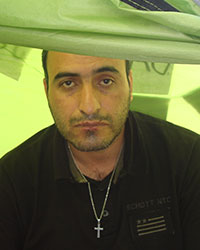UK: An Iranian is dying to believe – and no one seems to care
by - 20th August 2012
 ON A SMALL SQUARE in bustling central London there is a green tent. Inside that tent sits a man who has not eaten for more than two weeks.
ON A SMALL SQUARE in bustling central London there is a green tent. Inside that tent sits a man who has not eaten for more than two weeks.
Those who doubt his resolve to continue his hunger strike should look closely at his lips: he has sewn them together with fishing wire. Already the man is weak, and lies resting in his tent all day in fashionable Exmouth Market in Islington as traffic thickens, and pedestrians hurry by on their way to work.
Abdul Rahim, 40, who came from his native Iran to England three years ago, is a Christian and his strike protests the impending execution of a Christian Pastor by the Iranian authorities.
Rahim aims to draw more international attention to a case already infamous for what it reveals about religious freedom in Iran.
Pastor Youcef Nadarkhani was found guilty of apostasy from Islam in 2010 after four years in a notorious jail, and has been sentenced to hang.
Although Christianity is legal in Iran, and apostasy is not officially a crime, it can still be punished under a religious fatwa.
Nadarkhani argued at his trial that he converted as a child and so was never a Muslim in the first place. As a leader of a network of house churches it is very likely that the authorities were intimidated by his evangelical activity.
In a religious state, belonging to a different religion of whatever kind is easily interpreted as sedition. For this reason religious minorities in Iran are subject to strict control.
Abdul Rahim himself was converted to an unorthodox form of Christianity known as the Jesus Only Movement, through the witness of Pastor Nadarkhani who is its national leader. A spin-off from Pentecostalism, JOM does not recognize the Holy Trinity (God the Father, Son and Holy Spirit), only Jesus.
Rahim mumbles through scabbed lips that he left Iran because he feared for his freedom and longed to practise his faith openly.
You couldn’t get more open than this. Rahim’s tent is covered in crucifixes and the name of Jesus etched in crude handwriting on bits of A4 coloured paper, as well as information about Pastor Nadarkhani’s fate, and it must be seen by hundreds each day.
Most people however pass the tent by without a second glance, and after more than two weeks, Rahim’s arresting protest has still received no media attention.
In Iran, Nadarkhani has been given many chances to convert to Islam and thus stop his execution, but he has refused to renounce his faith.
Amnesty International has declared him a prisoner of conscience. In 2011 US President Barak Obama and UK foreign secretary William Hague released statements condemning his death sentence following a Times campaign.
Since then, Iran’s state media has claimed that Nadarkhani was never on trial for apostasy and was actually convicted of violent crimes, including rape, and for setting up a ‘house of corruption’, adding that he was a Zionist. He has denied all claims.
Nadarkhani’s lawyer maintains that the defendant was charged with apostasy, and this claim is supported by court documents.
It is clear that Rahim, who can mumble through his pierced lips, hopes that a renewed bout of international pressure could save Nadarkhani from death row, as was the case with Sakineh Ashtiani who was saved from a sentence of death by stoning following an international outcry.
Rahim is camped at Exmouth Market opposite the Amnesty International headquarters. A message on the side of his tent is clearly directed to them. ‘I would rather die here outside your office than do nothing.’
It remains to be seen whether the world will take notice of Rahim’s closed lips, or of the prison cell in which his old Pastor awaits his fate.
UK Christians are beginning to mobilise for Rahim. A spokesman for the Guildford-based Elam Ministries said: ‘Our take on this is that when someone is under a death threat, it’s not the time for other Christians to accuse him of heresy.
‘Strictly speaking he is a heretic. But also he’s suffered for the name of Jesus, and what has happened to him could have happened to any Trinitarian Christian. So it’s a matter of solidarity. ‘We see through a glass dimly.’
- Log in to post comments
